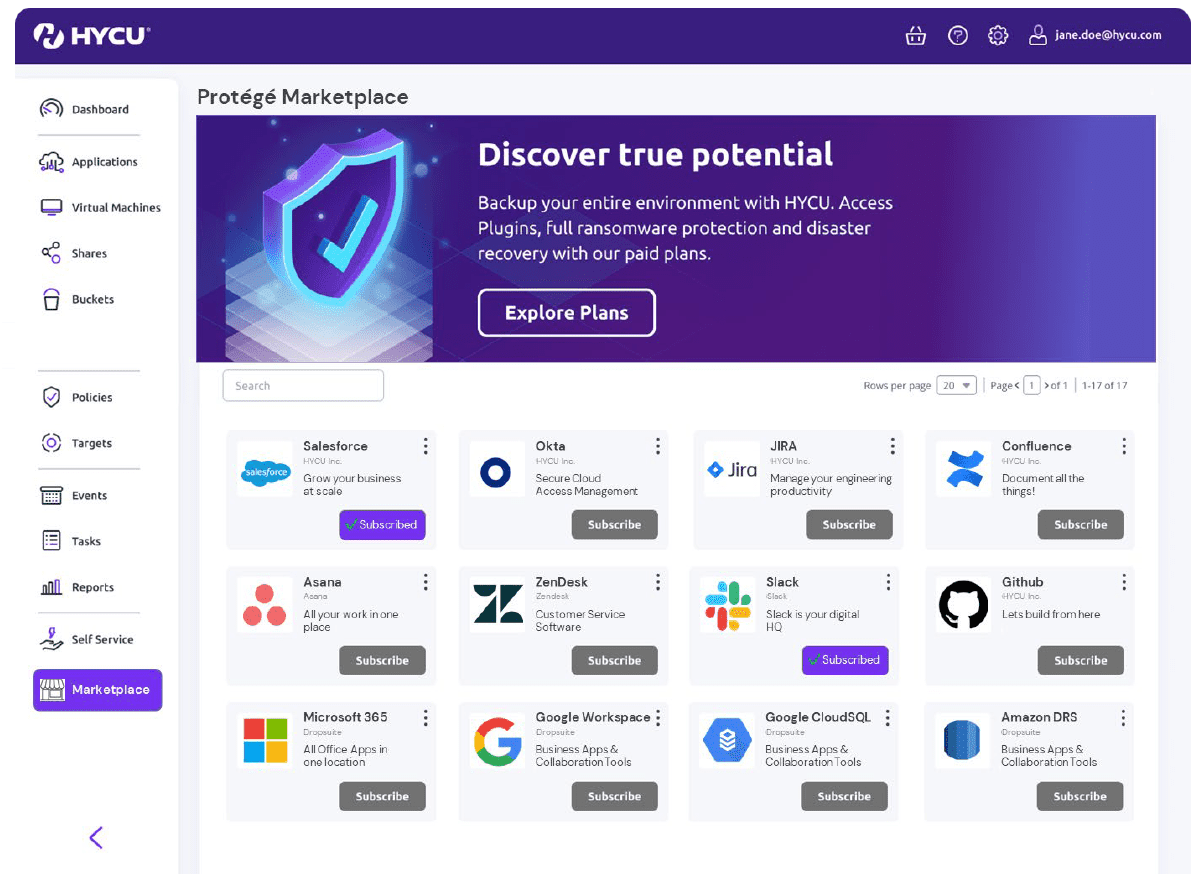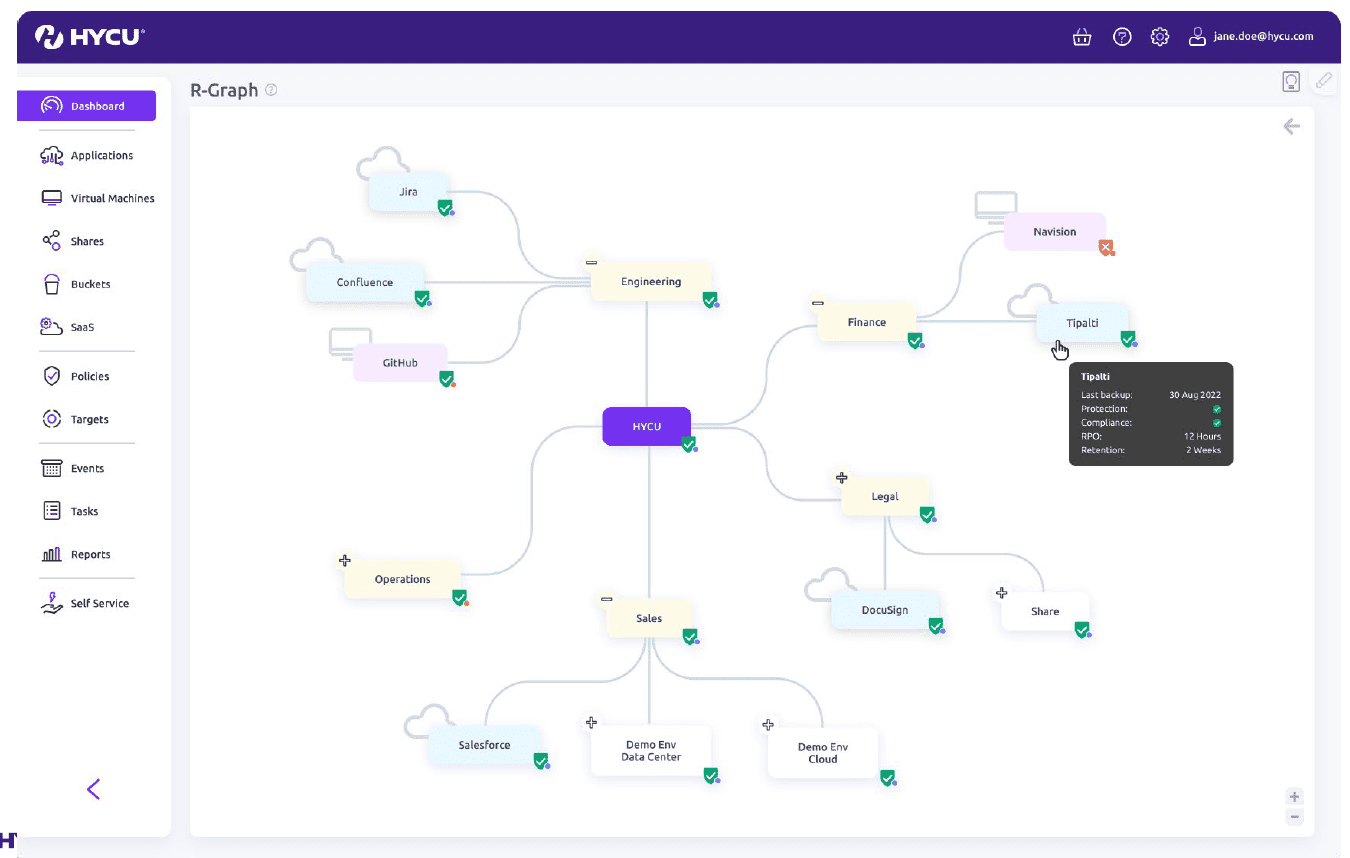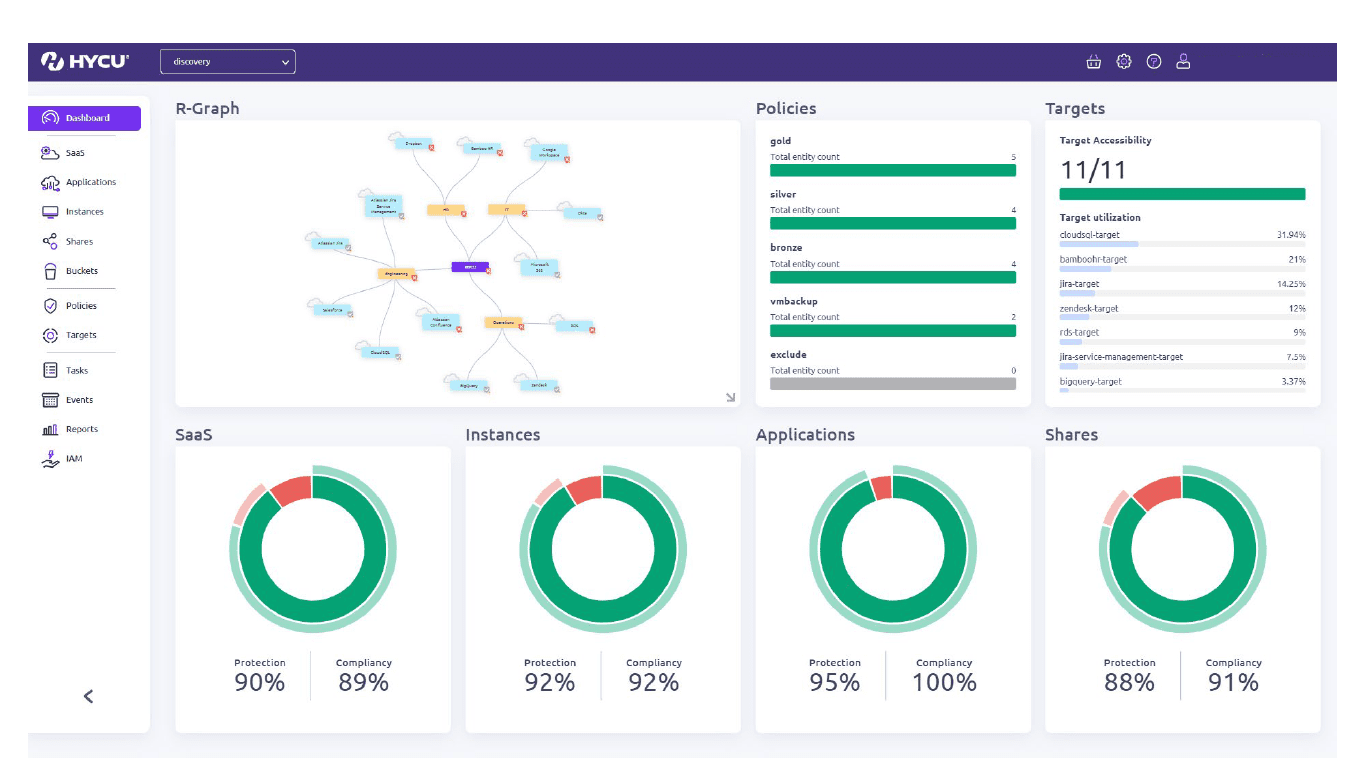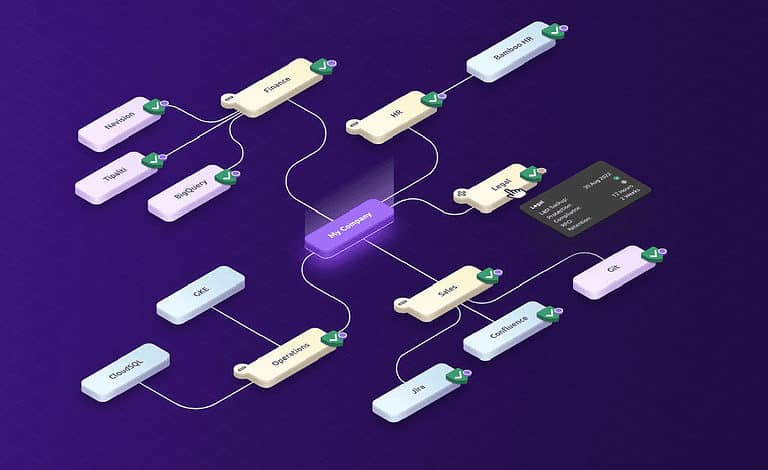SaaS vendors can add backup and DR to their solutions by linking to the new HYCU R-Cloud
HYCU today announced a new platform specifically aimed at SaaS solutions. There are already many of these today, but only more of them are coming. However, many users of these types of solutions do not realize that the solutions don’t include data protection. That is, the SaaS solution has no built-in backups. This is a big problem, we hear from HYCU during a session in which it proposes a solution to this problem.
SaaS accounts for about 70 percent of organizations’ software use, according to HYCU’s information. In the U.S. alone, according to their information, there would be about 17,000 providers of SaaS solutions. An average medium-sized company has 217 in use. HYCU itself uses about 70, which all generate and store a lot of data. SaaS providers generally don’t provide any protection for this data in the form of backups.
TIP: In an earlier article on HYCU, where we talked mostly about backups in the multicloud, it was already clear that a bridge to SaaS was coming.
Things have to change
There are vendors on the market that provide backup services for specific SaaS solutions, like Microsoft 365, Google Workspace, but also Salesforce. Admittedly, that already covers quite a bit of data you want to protect as an organization. However, there remain plenty of applications whose data remains unprotected.
It is difficult, if not impossible, for SaaS vendors to build in this protection, says HYCU CEO Simon Taylor during his presentation. It would take far too long, according to him, in part because of a lack of expertise in this area. Traditional backup and DR solution providers won’t solve this either, according to Taylor, because the industry in which HYCU also operates is an“arrogant bunch”. “We decide what we protect and what we don’t,” as he puts it.
At HYCU, they want to do things differently from now on. “We want to turn the whole industry upside down,” Taylor said. Right now, building connectors between SaaS solutions and platforms from backup and DR vendors lies primarily with those vendors. However, this is impossible for any single vendor to do for the 17,000 SaaS solutions we talked about earlier. Hence, HYCU is now turning it around, with the launch of R-Cloud.
What is HYCU R-Cloud?
Basically, HYCU R-Cloud is a development platform for data protection. The idea is that SaaS solution providers themselves connect to HYCU’s services through this platform. R-Cloud is built on top of the existing Protégé platform, the Data Protection as a Service solution that HYCU offers. In fact, it is an extension of what HYCU did before, when they connected at a higher level between the services it built itself for Nutanix and Microsoft, among others. So now HYCU has made this extensible platform generic, you might say.

R-Cloud should make it possible for SaaS vendors and ISVs to add backup and recovery to a solution in three days. That’s quite a bold statement, since no two SaaS solutions are the same. One of the reasons HYCU dares to make this statement is that it uses a low-code/no-code development environment to get apps into the marketplace for HYCU R-Cloud. This allows you to build connectors faster in an extremely simple-looking environment. It consists of no more than three steps: List, Backup, Recover. HYCU does not invent the basic code needed to build these parts of the connector itself. For that, it uses Swagger code. In other words, we are dealing here with integrations based on OpenAPI.

Another part of R-Cloud is automated discovery of the SaaS solutions you run in your environment. You can then see graphically which solution’s data is protected and which is not. HYCU calls this graphical view an R-Graph. To quickly see this view, you can log in via Okta or Active Directory with SSO.
Currently, R-Cloud is only available for SaaS solutions running in the cloud. There is no support yet for SaaS solutions that organizations run on-prem. However, HYCU is working on that, so that is coming.
What will be the impact of HYCU R-Cloud?
Taylor usually doesn’t shy away from firm statements. We saw an example of that above. To indicate how important HYCU R-Cloud is to the company and to the market, he has also come up with a nice one. He calls it “our penicillin moment,” referring to the discovery of penicillin in 1928. This discovery had a huge impact on medicine and was the basis for the development of antibiotics. It has saved many lives in the last 100 or so years. In addition, it was also discovered by accident.
To start with the latter, HYCU didn’t start out as a company with with R-Cloud as its goal. So it was not a goal in itself to be able to offer SaaS backups in this way. It was more of a hunch, after HYCU connected the separate services it had already built. Then suddenly it all sounded very logical, but there was no premeditation. If HYCU succeeds in getting many vendors to connect to the R-Cloud platform, however, the impact of this “accidental” discovery could be significant.
The latter is not at all a certainty as far as we are concerned. We have seen so many solutions and platforms that look good on paper. Then, in practice, it turned out that there is very little interest in them. Ultimately, HYCU still depends on the willingness of SaaS vendors and ISVs to build the connectors to R-Cloud.
While the promise (based on a little over ten connectors HYCU has built itself) is that a link is built in three days, in practice we have yet to see that. After all, no two SaaS solutions are the same, so quite a bit of tinkering with the basic code of the connectors is inevitable. The SaaS provider itself will have to do that, or an ISV in between. For the latter, this in itself will be doable, but for the SaaS provider it can be more difficult. We noted above that this group lacks the knowledge to add backups to their solutions. So why should they be able to do so now? Surely it will take some high-code to get the connector to work. In other words, the support structure around R-Cloud will be critical.
In conversation with Taylor, the latter indicates that HYCU will be satisfied if they have about a hundred integrations live by the end of 2023. They have already built a little more than ten themselves, so that would mean another ninety or so ISVs/SaaS vendors would have to bite. Reading between the lines, we note that Taylor secretly assumes they will reach these numbers well before the end of the year. There’s no lack of confidence in the new platform, that’s for sure.

Is HYCU R-Cloud enough?
To conclude this article, we want to address the question of when SaaS vendors will really feel the need to add backup and DR to their solutions. Because that’s basically what HYCU appeals to with the launch of HYCU R-Cloud. Is it mainly a lack of knowledge and time to do so, as HYCU seems to suggest? Or is it simply due to disinterest. The vendors don’t have to do it, so why should they incur additional costs to add it?
You could, of course, say that adding backup and DR could be a reason for customers to choose a solution rather than one that doesn’t have it. There is undoubtedly a grain of truth in that, but many customers still don’t give this aspect a huge amount of thought. So whether it will create much additional business for the vendor remains to be seen. In addition, a SaaS solution with backup and DR will also undoubtedly be more expensive than without it. As an aside here, a vendor pays HYCU nothing for building and adding the connector to the marketplace. HYCU obviously hopes that revenue will come naturally after that. Especially if larger SaaS players start selling a lot and thus sell HYCU on top of it, so to speak, then it could become profitable quite quickly.
It could also be that with the launch of R-Cloud, HYCU is anticipating what may come next in the market. On the one hand, you can think of laws and regulations for SaaS vendors. It may well be that there will be requirements from umbrella organizations for SaaS providers in terms of data protection. On the other hand, we can imagine that additional requirements will be imposed, particularly from the angle of cyber insurance. It isn’t that strange to assume that insurance companies will not pay out if an organization uses SaaS services without providing proper backups. If that happens, HYCU is in the front row as a first mover.
In any case, the first move HYCU has made (the introduction of R-Cloud) is very interesting as far as we are concerned. At least conceptually, it seems to be a step in the right direction. Now it remains to be seen how much traction the platform gets in the market. If it does, HYCU will have a hit on its hands. If not, the company has at least shown that it is willing and able to take an innovative look at its offering.
